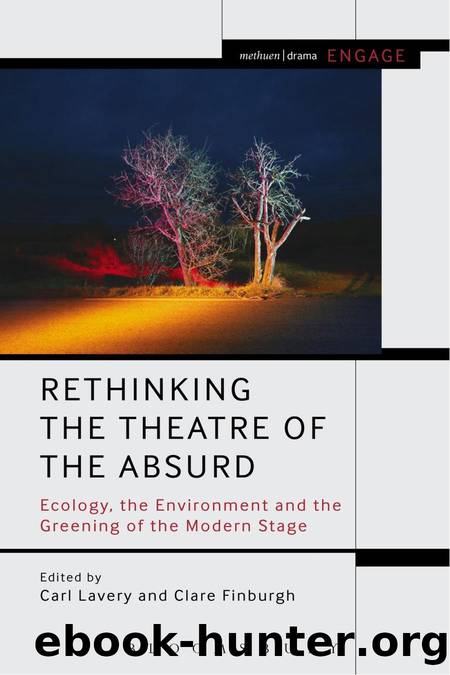Rethinking the Theatre of the Absurd by Carl Lavery;Clare Finburgh Delijani; & Clare Finburgh

Author:Carl Lavery;Clare Finburgh Delijani; & Clare Finburgh
Language: eng
Format: epub
ISBN: 9781472513205
Publisher: Bloomsbury UK
Published: 2019-11-23T00:00:00+00:00
Professor Taranne (1951)
The only references to the environmental landscape in Professor Taranne are those to the beach where the eponymous Professor has been accused of exposing himself to young girls. The reasons he gives for undressing on the beach are twofold: first, he has forgotten his money and is unable to hire a cabin, and second, âYou tell me you can always go behind the cabins, but there the sandâs never changed and itâs so dirty,â Taranne says.42 A significant part of the Professorâs defence against the accusation of the young girls is that local environmental degradation prevents him from getting changed more discreetly. But it is more than the beach that has been soiled and degraded; the episode with the girls and Taranneâs act of removing his clothes at the end of the play signal difficulties with sexuality and the naked body. Furthermore, Taranne is accused of plagiarizing the work of another academic in another instance of degrading exposure.
Professor Taranne is a transcribed dream and Adamov claimed to have made only a single change: replacing a reference to himself with the name of Taranne.43 The disgrace of Taranneâs exposure to the girls directly echoes that of Adamov in âThe Endless Humiliationâ, where he remembers a rainy afternoon in his childhood: âI remember ⦠lying down on the sidewalk of a deserted suburb having taken off all my clothes, trembling in both terror and desire to be discovered in this degrading attitudeâ.44 The desire to be seen naked and accepted is an acknowledgement of the continuity of human and non-human in the biosphere, but, as Adamov states in âThe Endless Humiliationâ, âmodern man cannot bear to have near him even one of the great defining images which permit a glimpse of the creature of mud, flesh, and bloodâ.45 The conflict between the desire to be observed naked in public and societal norms is part of the disturbance in Adamov/Taranneâs psychic ecology that is connected to the process of separating the social from the environmental, the human from the animal. To move beyond this binary is to engage in what Deleuze and Guattari refer to as âbecoming-animalâ, a form of ecstatic and collective emancipation that the authorities always move quickly to prevent on account of how âpacksâ or âswarmsâ are more difficult to contain than solitary individuals.46
Without effecting a significant change in the social ecology, what might be an appropriate mode of expression for Adamov/Taranneâs desire to be naked? At the end of the play, Taranne hangs up a large map on the wall: âThe map is a large expanse, grey, uniform, absolutely empty,â then he âlooks at it for a long moment [and] very slowly begins to take off his clothesâ.47 The blankness of the map indicates a no-place, a utopia, where it is possible for Taranneâs desire for exposure to be expressed without resulting in legal action or feeding the fear that its expression will cause harm to others. Guattari recognizes the need to provide opportunities and spaces for
Download
This site does not store any files on its server. We only index and link to content provided by other sites. Please contact the content providers to delete copyright contents if any and email us, we'll remove relevant links or contents immediately.
Eats, Shoots & Leaves by Lynne Truss(1341)
Nickel and Dimed by Barbara Ehrenreich(1138)
Midnight's children by Salman Rushdie(1016)
The Imaginary Invalid by Molière(1001)
Bring Up the Bodies by Hilary Mantel(881)
Black Coffee (Poirot) by Agatha Christie(845)
The Lovely Bones by Sebold Alice(807)
The 500 by Matthew Quirk(807)
The Seagull by Anton Chekhov(802)
Buried Child by Sam Shepard(758)
Steven Berkoff by Steven Berkoff(738)
An Ideal Husband by Oscar Wilde(730)
The Bourgeois Gentleman (World Classics) by Molière(722)
The Comedy Bible by Judy Carter(666)
Profiles by Tynan Kenneth; Tynan Kathleen;(661)
Finding Roger by Rick Elice(656)
Tobacco Road by Erskine Caldwell(654)
The Guys by Anne Nelson(606)
Mrs. Warren's Profession by George Bernard Shaw(600)
